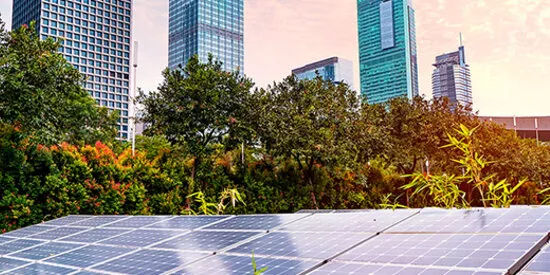
Supporting Australian real estate sustainability goals
How an innovative green loan in Australia is helping a major real estate investor and fund manager meet ambitious sustainability targets.
How green is your office space? For Australia-listed Cromwell Property Group, the answer is now part of its financial commitments.
Real estate ranks as one of the most important sectors globally in the race to net zero, and also one of the most vulnerable to the risks of climate change. Direct and indirect emissions from the built environment, including from building operations and construction, account for nearly 40% of worldwide CO2 emissions.1
For this reason, the level of commitment that real estate companies demonstrate in their respective transition pathways has significant real-world implications. This is also where the finance sector can play an important role in helping companies reach their goals. Increasingly, this means rethinking traditional approaches to debt financing by promoting solutions like green loans, or sustainability-linked loans — or both.
Ambitious reduction targets
That combined approach was taken by Cromwell, a real estate investor and fund manager, when it recently bolstered its environmental, social and governance (ESG) commitments via an innovative conversion of a multi-bank, A$1.2 billion (€745 million) lending facility. The new loan includes Cromwell’s most ambitious emission reductions to date: a reduction of scope 3 greenhouse gas emissions of more than 4.4 million kilograms of carbon dioxide equivalent (or KgCO2e) – equal to the emissions from 784 households – by 2028 when compared against the 2023 baseline; additional targets linked to Cromwell’s target of net zero scope 1 and 2 emissions by 2035. Together with a reduction of Cromwell’s gender pay gap to a maximum of 12% by 2028.2
The deal stands out in that it qualifies as both a green loan and a sustainability-linked loan (SLL) under the principles set by the Asia Pacific Loan Market Association (APLMA). Proceeds from green loans must be used exclusively to finance green projects or investments, while SLLs provide incentives to promote the achievement of environmental or social targets over the tenor of the facility.
Societe Generale acted as joint sustainability coordinator, playing a key role in the structuring of the deal and the sustainability-related KPIs.
Reporting of Scope 3 emissions
For real estate companies, scope 3 emissions can be trickier to accurately track, as this includes things such as emissions related to materials like concrete used in construction process, the emissions of tenants of a building, or the emissions of employees commuting to or from the office. Reporting of this data has traditionally lagged that of scope 1 and 2 emissions across sectors. But for commercial real estate companies, scope 3 can account for as much as 85% of the carbon footprint3, so tackling these is an imperative for hitting net zero targets.
Cromwell released its full scope 3 emissions inventory for the first time in January, becoming one of the few Australian commercial property organisations to publish an emissions footprint across 100% of its global network and supply chain.4
“Building on that announcement, we have been working with tenants and suppliers across all our upstream and downstream business activities – covering our entire supply chain of tenant activities; funds under management; joint ventures; and embodied carbon sources – to stretch our net zero approach beyond our operational control,” said Lara Young, Cromwell’s Group Head of ESG.
“It’s rare in the sustainable finance market to see a transaction like this that combines the requirements of both green loans and sustainability-linked loans,” said Tessa Dann, Head of Sustainable Finance for Asia Pacific at Societe Generale. “In this case, it was a natural fit for Cromwell, to showcase their ESG ambitions in the commercial real estate sector and to support the green transition.”
The deal marked the second time in a year that Societe Generale has worked with Cromwell in the role of sustainability coordinator, after advising the property company on establishing its Sustainable Finance Framework in 2023.5
“Acting as sustainability coordinator demonstrates Societe Generale’s longstanding commitment to supporting the green transition, in this instance in the commercial real estate sector,” said Tessa Dann. “We believe this serves as an excellent example to encourage more action on the reduction of scope 3 emissions in particular.”
1. www.unepfi.org/themes/climate-change/40-of-emissions-come-from-real-estate-heres-how-the-sector-can-decarbonize/
2. www.cromwellpropertygroup.com/cromwell-links-new-loan-facility-to-emissions-reduction-gender-pay-gap-targets/
3. ukgbc.org/resources/guide-to-scope-3-reporting-in-commercial-real-estate/
4. www.cromwellpropertygroup.com/cromwell-releases-full-scope-3-inventory-sets-short-and-long-term-emission-reduction-targets/
5. www.cromwellpropertygroup.com/cromwell-transitions-industry-leading-green-trust-under-new-sustainable-finance-framework/




